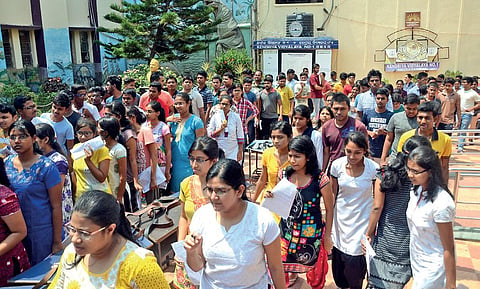

BHUBANESWAR: There was a time when Kolkata, Pune, Hyderabad, Noida and Delhi enjoyed the monopoly of being the educational hubs in the country. The narrative, though, has been slowly yet steadily shifting towards Bhubaneswar, considered an emerging education hub in eastern India.
Every year, as per state government’s higher education records, over one lakh students from across the country arrive in the Tier-2 city to pursue higher studies in various streams, be it humanities, medical, engineering or management. The city has also been attracting international students both under regular admissions and student exchange programmes of various educational institutes.
There are 10 major institutes of higher learning and research in Bhubaneswar including Centrally-funded institutions that are engaged in high-quality teaching and research and some of them better placed in India’s National Institutional Ranking Framework. These include IIT, XIMB, International Institute of Information Technology, National Research Centre for Water Technology, NISER, IMMT, CIFA, and Central Tool Room & Training Centre.
Besides, there are four state-run general and technical universities, the oldest being Utkal University which was established in 1943, five years before the first Prime Minister Pandit Jawaharlal Nehru laid the foundation stone of Bhubaneswar in 1948. It also happens to be the largest in Odisha with 351 affiliated colleges and an A+ grade from the National Assessment and Accreditation Council. This apart, there are several colleges of repute offering UG and PG courses.
“The change in the educational landscape of Bhubaneswar from the period when I was a student of Utkal University 40 years back till now has been phenomenal. Back then, there was only Ravenshaw College in Cuttack and the CSIR-Institute of Minerals and Materials Technology which was then called Regional Research Laboratory. Today, the city is offering a wide variety of traditional and contemporary courses that would interest students from across the country and abroad,” said chairman of Odisha State Higher Education Council Ashok Das.
And a majority of the students passing out from both the private and public universities in the city are doing well in job markets, if placement drives in Utkal, OUAT, XIMB, KIIT and Siksha O Anusandhan universities are anything to go by. As far as medical education is concerned, the city has All India Institute of Medical Sciences (AIIMS) which admitted its first batch of students in 2012, besides, the privately-managed KIMS, IMS & SUM Hospital and Hi-Tech Medical. Bhubaneswar is also the only Tier-2 city in the country to host the top five Indian IT companies - Infosys, Wipro, TCS, Tech Mahindra and Mindtree.
Academicians attribute the rush of educational institutes to set up campuses in Bhubaneswar to its connectivity with all metros and places or prominence in the country and pro-education initiatives of the Odisha government. Similarly, the students feel that despite Bhubaneswar being smaller in size, academics and infrastructure of educational institutes is of better quality than in metros. “Besides the good quality career counseling and education that is provided here, there are many colleges which offer courses which are relevant to the job market today. Plus, there is a placement guarantee,” said Ananya Ghosh who is a student of SOA University. Ananya is a native of Kolkata.
Educationist Pritish Acharya feels one of the biggest highlights of the city is the World Skill Centre, an advanced skill training institute under the Odisha Skill Development Authority. “The brand Skilled in Odisha is already popular in other states,” he said.
The only problem Bhubaneswar has, according to Das, is that as an educational hub it is yet to get a character like Bengaluru which is known for IT, Kolkata for Science or Pune and Maharashtra for management.
“Bhubaneswar has everything including humanities, culture, language, engineering and science but it cannot be branded as a hub for a particular school of studies because of lack of synergy between all the institutes of higher education,” he said.
But a solution to this is also being worked out. A year after the National Education Policy-2020 was announced, the Centre in 2021 decided to open higher education clusters in six cities of the country and Bhubaneswar is one among them. The rest are in Delhi, Bengaluru, Jodhpur and Hyderabad.
Under this cluster system, higher education institutes, without limiting their individual autonomy, would coordinate, share resources and collaborate for teaching and learning, besides research and development. It will allow good private and public universities in the city to collaborate and encourage partnerships across institutions. This cluster is currently being incubated in KIIT under the guidance of scientist Mrutyunjay Suar.